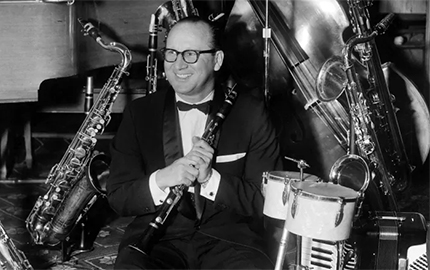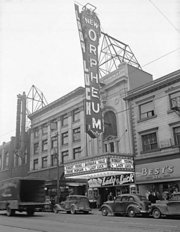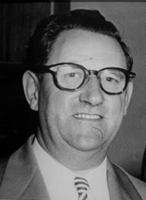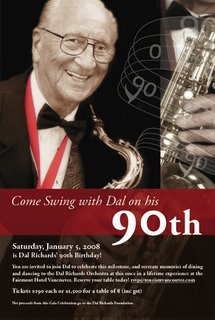Dal Richards

Dallas Murray ‘Dal’ Richards, who was named for Dr. Dallas Perry, the man who delivered him at Vancouver General Hospital on January 5, 1918, has been playing music for us for more than 70 years. He’s played the Orpheum more times than he can remember.
When he was little, eight or nine years old, he remembers two regular family destinations: the food floor at Woodward’s, and the “big time” vaudeville at the Beacon Theatre on Hastings Street. Dal recollects those times and their performers, like the phenomenal Eddie Peabody, King of the Banjo, whose astonishing career lasted more than 50 years. (Ivan Ackery tells a great story of one appearance by Peabody at the Strand Theatre. The theatre was packed, and there was no more room inside, so during the other acts Peabody went out on to Georgia Street and played his banjo for the people who couldn’t get in!)
“I remember Betty Compson, too,” Dal says. “She was a big movie star in the early 1930s. Her shtick on stage was imitating Marlene Dietrich. She sat straddling a cane chair like Dietrich did in Blue Angel.” Years later, in 1933, after he’d joined Arthur Delamont’s Kitsilano Boys Band, 15-year-old Dal discovered that Delamont had been in the pit orchestra at the Beacon. In his autobiography, Ivan Ackery mentions that Delamont was also in the orchestra at the Strand Theatre.
At the Orpheum, young Dal enjoyed the acrobatic tumbling of a trio of performers whose bottom man (the strongest fellow who held up the other two) was a muscular fellow named Burt Lancaster, who later made something of a name for himself in the movies.
A major component of vaudeville at the time was the Fanchon & Marco organization. Fanchon and Marco were a brother and sister (Fanchon Wolff Simon and Marco Wolff) who began as a dance team, then began staging shows themselves. They became a real force in vaudeville, developing a system in which their stars moved from town to town while local dancers performed with them. They brought a lot of shows to Vancouver. In November 1927, for example, the month the Orpheum opened, Fanchon & Marco were presenting a stage show called Jade at the Strand on Georgia Street. Maybe 9-year-old Dal was in the audience! He remembers that Jackie Souders led the Strand band, and we learn from Ivan Ackery’s book that that was from 1927 to 1930. “It was Jackie,” Ackery writes, “who, when he was leading an orchestra at Seattle’s Butler Hotel in the late 1920s had given Bing Crosby one of his first breaks. Bing, of course, was born in Spokane.”

Dal’s first recollection of the Orpheum is when he was in high school in the mid-’30s. “I used to come down to the Orpheum on the Interurban to see the Saturday matinees. A particular favorite of mine was Busby Berkeley’s Gold Diggers of 1935. Berkeley was famous for his elaborate musical numbers, and in that one he had 56 showgirls sitting at 56 white baby grand pianos. Spectacular! Y’know, musicians were losing work around this time, but it wasn’t all because of radio and sound movies. It was pretty difficult on a live stage to equal a Busby Berkeley number! There was still vaudeville in the ’40s, but it was the lowest of the low. You got comics who hadn’t changed their routines in 50 years.
“Earl Hill led the orchestra at the Orpheum when I was going. He had a 16-piece band, used to do three shows a day. I remember the West End being covered with posters for shows at the Orpheum.”
By the mid-1930s Dal had a little band of his own—sometimes five pieces, sometimes six—that played a lot of gigs at local golf clubs: Point Grey, Shaughnessy and the like. In 1935 he and his band were featured on CJOR Radio. “We had a singer for that CJOR gig, Bernie Braden. Braden and I were both students at Magee High School. Later, he became a big star in Britain.” Dal was performing, too, at the Alma Academy Ballroom. “That was at Alma and Broadway. The ballroom was upstairs. That’s where I was in April of 1940 when I got a call from the Hotel Vancouver.”
It seems Mart Kenney, the orchestra leader at the hotel’s Panorama Roof, was leaving to go east. Would Dal bring his band in to audition?
“Well, I did, and we got a job for six weeks. Then the six weeks became 12, the 12 became 24, then 48 . . . we ended up staying there for 25 years.” Specifically, from April 1940 to August 1965, a one-location run unparalleled by any other Canadian orchestra.
Of course exposure at the Hotel Vancouver brought more offers. “I got a call from Ivan Ackery. He had a policy of featuring local bands on Friday nights at the Orpheum. So we started playing there on stage, 45 minutes between the movies. By this time I had 10 in the band. The band members got $6 each for our gig at the Orpheum, I got $12 as leader and sax player. When parking went up to 50 cents in the neighborhood, I just about had a heart attack.

“One day Ivan said to me, ‘I notice you don’t have a singer.’ He told me he’d heard a little girl performing at the Kitsilano Showboat. She sang There’ll Always Be An England, and brought the house down. So we brought her in and she started singing with us. She was 13 years old. Her name was Juliette Sysak.” So Our Pet Juliette’s first professional engagement was singing with Dal Richards’ band at the Orpheum Theatre. When she repeated her singing of There’ll Always Be An England, the wartime audience rose when she was done and gave her a standing ovation.
“I approached her about singing with my band at the Panorama Roof. I became her legal guardian, and she sang with us for three years. Then she went to Toronto and sang with Alan Young on his Buckingham Cigarette Show on CBC . . . and she became a star.”
Dal admits that after his first performance at the Orpheum, “I was feeling full of myself. I was 22, and I’d been on the same stage as Frank Sinatra, Louis Armstrong, Jack Benny. Then Ivan comes up and says, ‘Good show, Dal. But you forgot the balcony’.”
Dal’s response: Huh?
“There are 1,400 seats on the orchestra level,” Ivan said, “but there are hundreds more up there in the balcony. You forgot those people.”
To this day, Dal remembers: Don’t Forget The Balcony.
Beryl Boden sang with the band for a while, then left for New York. She was succeeded in 1950 by Lorraine McAllister, who performed with Dal’s band for almost 15 years and, in 1951, became Mrs. Dal Richards. “Lorraine sang with the Nabobettes,” Dal recalls. They were the vocal group on Nabob’s Harmony House, an Orpheum fixture for 11 years, and heard from coast to coast on CBC Radio. Also heard every week for many years and more than 2,000 programs on the national network was Dal’s own show from the Panorama Roof. (The author was one of the many announcers who had the pleasure of appearing on that program.) Dal treasures a tape of one of those shows, a 1941 broadcast featuring Juliette in one of her very first appearances. The tape was used by the CBC in a special celebrating their 50th year in television.
“Juliette came back for a while in the fall of 1951 to sing with us,” Dal says, “when Lorraine was pregnant with our daughter, Dallas.” Tragically, Lorraine died of cancer in 1984.
Dal’s first gig was more than 70 years ago, his first appearance at the Orpheum more than 65 years ago, and he is still active in local entertainment. In fact, it’s more than likely he should be in the Guinness Book of World Records for this astonishing fact: he has performed somewhere with his band every New Year’s Eve since 1936. That is 71 consecutive New Year’s Eve gigs. Not even Guy Lombardo matched that. “There’s an old saying in the music business,” Dal says, grinning. “If you don’t have a New Year’s gig, sell your horn.”
Honors have been generously heaped upon Dal during those decades, and he and his band have been at a startling number of local launches :
- They opened the Vogue Theatre (left) in April of 1941
- Dal’s band played at the opening of Empire Stadium in 1954
- They played at the ceremony ushering the B.C. Lions into the Canadian Football League. The Lions’ first game was August 28, 1954 against the Winnipeg Blue Bombers
- The band opened the Queen Elizabeth Theatre July 5, 1959
- They played at the opening October 15, 1983 of the Vancouver Art Gallery’s present location, in the renovated courthouse
- They opened what was then Vancouver’s Trade and Convention Centre (and is now the Vancouver Convention and Exhibition Centre) on July 4, 1987
Dal’s band played at Lions halftime shows for more than 40 years from 1954, and became a tradition at the annual Grey Cup Dinners. They’ve played before big crowds at Canada Day festivities at Canada Place, and have played for thousands at special Remembrance Day shows at the Orpheum. There’s more! Dal has performed as a musician, in one capacity or another, in every Pacific National Exhibition since 1939.
With all this, he has time to serve the Variety Club of B.C. in its long and dedicated service to special needs children, and the band has performed for years at Variety Club Christmas parties and fund raising dinners. He was musical director of Variety’s annual telethon for 17 years. In 1993, the Club honored Dal—who was Variety’s Executive Director from 1986 to 1989—with its Heart Award and the Presidential Citation, an international award. He won Vancouver’s Civic Merit Award in 1994, and—his proudest moment—on May 3rd, 1995 received the Order of Canada from Governor General Romeo Le Blanc. In early 1999 Dal received an Honorary Doctorate from his alma mater, the B.C. Institute of Technology. (He’d taken a course in hotel management there, but his career managing local hotels is for another book—as is his establishment of an annual scholarship in hospitality, first awarded in 2002.)
When the show business fraternity of Vancouver celebrated Ivan Ackery’s 80th birthday in 1979, you know who conducted the orchestra at the Orpheum. Adding to the excitement was the appearance of Juliette, who sang—several decades after her rendition of it had brought the audience to its feet at the Orpheum—There’ll Always Be An England. She got another Standing O this time, too!

At 90, Dal is still vigorous, still playing regular gigs around Vancouver and other cities, still involved in the community. In 2002 he was the first winner of the Vancouver Board of Trade’s Spirit of Vancouver Award. 2002 was a good year for Dal for another reason: he married Muriel Honey, well known to local media people as manager of the City of Vancouver’s Film and Events Office, and for her years of work in the mayor’s office and later for the Rick Hansen Institute at UBC.
Dal has a weekly big band radio show on 600 AM.
In 1990 Dal Richards’ connection with the Orpheum was strengthened even further when he was inducted into the B.C. Entertainment Hall of Fame, housed, of course, within the grand old theatre.
Note: Dal passed away on New Year’s eve 2015 at the age of 97 – a few days shy of his 98th birthday. Up until his passing, Dal still played the clarinet, alto and tenor sax, and conducted his band through more than 100 gigs a year.
